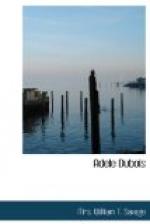generous, half-savage heroine, and her specious, handsome,
unprincipled, soi-disant father, is exciting;
and the sympathy of the reader is cleverly enlisted
for the heroine, Lucia, from the first moment.
The personages have all of them a certain look of
reality, and there is a notion of likeness which insures
the reader’s interest. We can recommend
“Twice Lost” as a novel worth reading.—Athenaeum.
By far the cleverest book on our list is “Twice Lost".... This is bold and skilful drawing, and it is a fair sample of the earlier half of the volume. The combined vigor, ease, and perspicuity of the writing is unusual.—Guardian.
Nothing can be better of its kind than the first portion of “Twice Lost".... The caustic humor and strong common sense which mark the sketches of character in this book, betray a keenness of observation and aptitude for producing a telling likeness with a few strokes, which need only a wider cultivation to secure a more complete success than has been attained in “Twice Lost".—Westminster Review.
It is quite clear that the author has given a good deal of thought to the construction of the story, with a view to producing strong interest without the use of the common sensational expedients. To say that “Twice Lost” is very well written, and very interesting, would not be doing it justice.—Morning Herald.
There can be no doubt of the author’s power. She holds her characters and incidents well in hand, writes firmly, and often very happily, and there are many passages which indicate power much above mediocrity.—London Review.
Not very often do we meet with a novel so thoroughly good as “Twice Lost”. If, as may be assumed from both subject and style, its author is a woman, she may at once be classed with the Bronte sisters and George Eliot. She has the firm conception and distinct touch of the first-class artist. Her characters are real and individual.—Press.
This is a well-written romantic tale, in which we find many pleasing incidents and some successful portraiture of character. The character of Miss Derwent, the companion and governess of the heroine, Miss Langley, is very well developed in the course of the narrative. The moral tone of the book is very good, and so far as religious matters are touched upon, they are treated with propriety and reverence.— English Churchman.
The characters are well drawn—the
situations are new, the sentiments
are unsentimental, and the incidental
remarks those of a clever woman
who is reasonable and tolerant.—Globe.
The plot of this tale is an original
one, and well worked out.... We
can sincerely recommend this tale;
it is quite out of the general run
of books, and is sure to prove an
interesting one.—Observer.




